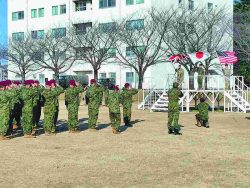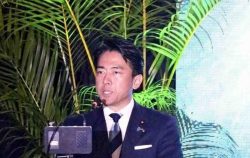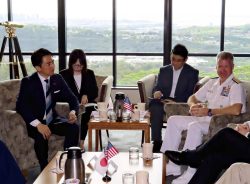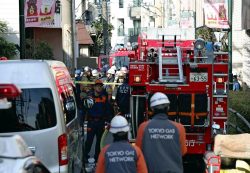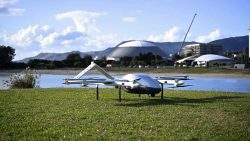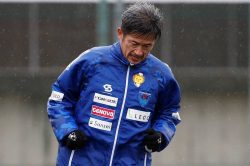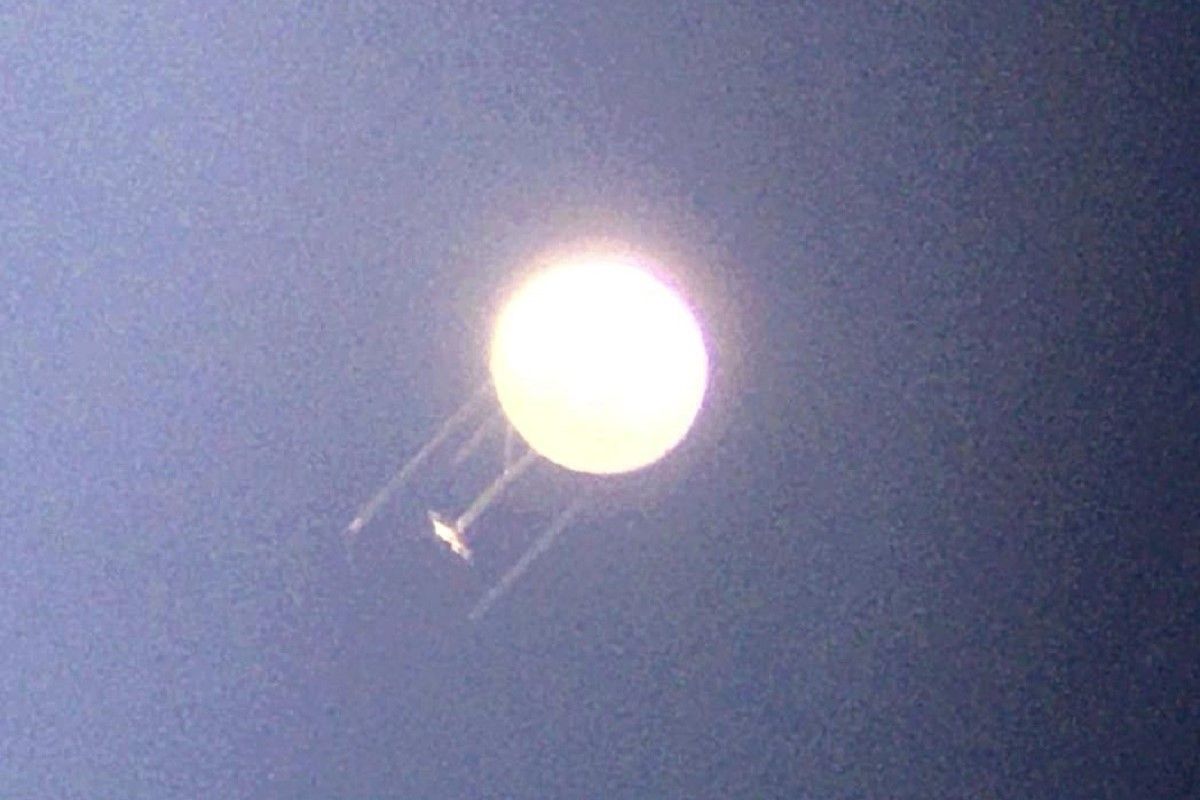
An object that was spotted in the sky over Satsuma-Sendai, Kagoshima Prefecture, on Nov. 20, 2019.
2:00 JST, February 17, 2023
Revelations that several flying objects believed to be unmanned Chinese surveillance balloons flew through Japanese airspace have sparked concerns about a gaping hole in Japan’s security landscape.
The government is scrambling to develop a response to further intrusions, such as by relaxing the conditions under which the Self-Defense Forces can use weapons to shoot down such objects if necessary. However, a string of thorny problems likely will confront the government if it makes the bold decision to actually take concrete action against flying objects.
The Defense Ministry announced Tuesday that what appeared to be Chinese surveillance balloons had flown through Japanese territorial airspace. The following day, government officials explained the aim of quickly formulating a plan to loosen the conditions under which the SDF could use weapons.
“Demonstrating that we will respond firmly to such an incident, including the option of shooting down such objects, could have the effect of deterring any attempts to fly strange objects over our nation,” one official said.
At a joint meeting of the Liberal Democratic Party’s National Defense and other divisions on Wednesday, former Defense Minister Itsunori Onodera urged the government to quickly deal with the matter. “Isn’t this a glaring hole in our nation’s defense?” Onodera said.
After the U.S. military shot down a Chinese balloon on Feb. 4, Defense Minister Yasukazu Hamada has suggested it was legally possible for the SDF to shoot down a similar balloon because that object could be considered an aircraft. Article 84 of the Self-Defense Forces Law allows “necessary measures” to be taken against an aircraft that violates Japanese airspace. These measures include the use of weapons.
However, the use of arms in response to an encroachment into Japanese airspace is authorized only for “legitimate self-defense” and during emergency evacuations.
The government’s conventional interpretation regarding the use of weapons has been based on a comment then Defense Agency chief Hosei Norota made to a question in the Diet in 1999. Norota said the SDF could use arms only in cases such as when there was an imminent threat of major damage to people’s lives and assets. Based on this, many officials within the government and the LDP felt that a political decision to order the downing of a balloon that “only floats through the air” would be difficult.
Consequently, the government adjusted its view on Article 84 and decided that, in the case of unmanned balloons and drones, it was possible to make a legal interpretation that would allow the use of weapons provided certain conditions were met — even in situations that did not fall under legitimate self-defense or emergency evacuations — because there was no risk that shooting down the object would harm a crew member.
Japan has been receiving information from the United States to help analyze the flying objects. It appears that piling additional pressure on China by demonstrating domestically and internationally that it has a system capable of shooting such objects down also was aimed at bringing Japan in line with the position of the United States.
Many hurdles to overcome
Chinese drones also commonly fly near the Senkaku Islands in Okinawa Prefecture, so dealing with intrusions into Japanese airspace by unmanned aircraft had become a major issue.
Although relaxing conditions covering the use of weapons could be seen as progress, Kunio Orita, a special professor at Reitaku University and a retired lieutenant general of the Air Self-Defense Force, said more must be done.
“A drone can be maneuvered, so it’s obvious that any intrusion into territorial airspace is intentional,” Orita said. “But it’s difficult to pinpoint the intentions behind these balloons. Detailed discussions will be needed to determine in which situations they should be shot down.”
Technical challenges also abound. The balloon shot down by the U.S. military on Feb. 4 was flying at an altitude of about 60,000 feet (about 18,000 meters). This is higher than the fighter aircraft’s typical service ceiling of about 50,000 feet.
“The air is quite thin at 60,000 feet, which affects the handling of the aircraft,” an ASDF fighter jet pilot told The Yomiuri Shimbun. “Pilots require superb skills at that altitude.”
The U.S. military shot down another airborne object above a lake in the Midwestern United States on Sunday. However, the first missile fired missed the target. Special training is essential for pilots to shoot down slow-moving objects, such as balloons, while flying fighter jets at high speed.
The balloon issue also could become a new source of friction in Japan-China relations. During a summit meeting in November, the governments of both nations agreed they would strengthen communication at every level to help improve bilateral ties. However, the balloons could pour cold water on the mood for dialogue.
Foreign Minister Yoshimasa Hayashi and Chinese Communist Party Politburo member Wang Yi — Beijing’s top diplomat — are scheduled to attend the Munich Security Conference that will start in the German city Friday. Hayashi has indicated his intention to make contact with Wang to continue dialogue while also pressing China to prevent reoccurrence. However, it remains unclear whether Beijing will accept this approach.
"Politics" POPULAR ARTICLE
-

Japanese Language Requirement Eyed for Permanent Residency Status; LDP Plans Revisions of Laws on Foreigners
-
-250x167.jpg)
Japan Eyes Plan to Accept Up To 1.23 Mil. Foreign Workers by End of Fiscal 2028
-

AI-Driven ‘Zero Clicks’ Phenomenon Threatens Democracy; News Outlets Must Be Able to Recover Costs, Stay Independent
-

Japanese Public, Private Sectors to Partner on ¥3 Tril. Project to Develop Domestic AI, SoftBank to Be Key Firm Involved
-

Japan’s Defense Ministry to Extend Reemployment Support for SDF Personnel to Age 65; Move Comes Amid Ongoing Labor Shortage
JN ACCESS RANKING
-

BOJ Gov. Ueda: Highly Likely Mechanism for Rising Wages, Prices Will Be Maintained
-

Core Inflation in Tokyo Slows in December but Stays above BOJ Target
-

Osaka-Kansai Expo’s Economic Impact Estimated at ¥3.6 Trillion, Takes Actual Visitor Numbers into Account
-

Japan Govt Adopts Measures to Curb Mega Solar Power Plant Projects Amid Environmental Concerns
-

Major Japan Firms’ Average Winter Bonus Tops ¥1 Mil.


